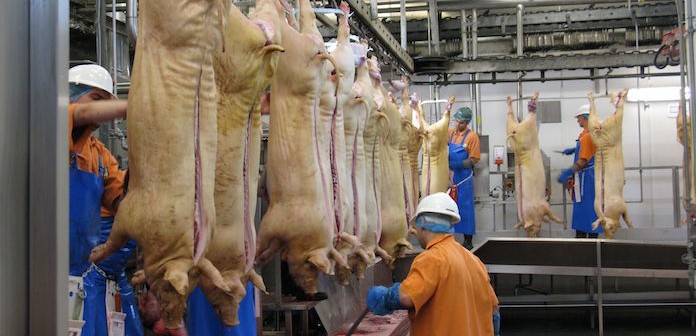There is set to be significant disruption to pork production in Northern Ireland this week, as Government vets carry out a five-day strike over an unsatisfactory pay deal.
Union members of the Veterinary Service Animal Health Group (VSAHG) and the NIPSA union, which represents the vets, are striking, preventing the slaughter of cattle, pigs, sheep or poultry without the presence of official vets in abattoirs. Border controls in Northern Ireland are also being disrupted by the action.
The Department of Agriculture, Environment and Rural Affairs (DAERA) has warned of the potential for ‘significant disruption’ to the delivery of many of the Department’s veterinary and animal health functions. These include delivery of official controls and other official activities across Sanitary and Phytosanitary (SPS) inspection facilities, meat plants and field operations.
“If there is no resolution to the current pay dispute, the industrial action is likely to present issues in relation to animal health and welfare, public health and continuity of agri-food supply chains,” it said.
“The Department fully respects the rights of colleagues to take industrial action and regrets sincerely that the budget situation that civil servants are trying their best to manage has meant that it has not been possible to provide a meaningful pay award for NI Civil Service staff.”
“The Department very much hopes that a resolution to the current position on NI Civil Service pay can be found as soon as possible.”
Disruption
There are anecdotal reports of disruptions in pork plants in Northern Ireland, with some pigs brought forward last week in anticipation of the disruption.
Commenting last week, the British Meat Processors Association (BMPA) said the strike would spark three major issues.
“The first is animal welfare, particularly in the pork sector, as pigs begin to back-up on farms,” Nick Allen, BMPA CEO said.
“The second is a commercial issue as those animals become too big and ‘out of scope’ for supermarket shelves, resulting in farmers unable to sell their livestock. And, because of the numbers of animals involved, it will take months to recover from the loss of those five production days.
“It will mean that meat plants will have to cease operations, causing loss of income for those businesses, and disrupting food supply chains. This is a particular worry as we enter the busiest period of the year in the run up to Christmas when our members are preparing festive products like hams and pigs-in-blankets for the Christmas market.”
The vets’ walkout could expose the scale of border checks that are still needed to get food from the UK mainland to Northern Ireland – even through the new ‘green lane’ – and will demonstrate that the Irish Sea border has not been removed, he added/
“Our members are extremely concerned over the lack information and a contingency plan. So far, they’ve heard nothing from the Northern Ireland Civil Service about if and how they plan to prioritise veterinary cover in meat plants to avoid causing animal welfare issues and disruption to the food supply chain.”
“With Stormont still not sitting, this will inevitably end up back in Westminster. So, on behalf of producers and processors, we would urge Government to step in to engage with all parties, draw up some emergency plans and, ultimately, help to settle this dispute.”
Pay disparity
NIPSA said the walkout was over a ‘decision to impose a derisory pay award of £552’ for civil service staff. Carmel Gates, from the union, said its members were ‘fed up’ with below-inflation pay offers.
She criticised Northern Ireland Secretary Chris Heaton-Harris for not engaging with her union over the pay dispute, telling BBC News NI’s Sunday Politics programme that she had written to on four separate occasions to request a meeting to discuss pay.
She said it was ‘incomprehensible’ that he had not engaged with the union as its members were ‘essential to the food chain and essential to ensure the trade will flow’.
The Association of Independent Meat Suppliers (AIMS) said the strike was triggered by a pay disparity with English and Welsh counterparts, following an unsatisfactory pay award.
It said the decision contrasts with England and Wales, where the Food Standards Agency (FSA) has allocated an additional £29.5 million to their contractor due to unforeseen recruitment costs.
AIMS said there was ‘growing discontentment’ amongst the Northern Ireland veterinary community as they believe they are being side-lined in pay negotiations.
A representative from the Northern Ireland Veterinary Association stated, “It’s disheartening to see our colleagues in other parts of the UK being valued more than us. All we seek is fair pay for the essential services we provide.”
Further concerns have arisen surrounding the allocation of the additional funds by the FSA to its contractor.
Worst time
John McClenahan, of the Ulster Farmers Union, said the strike has come at the worst possible time for producers.
“A lot of our factories are looking at the run into Christmas,”he told BBC News NI’s Good Morning Ulster programme. It’s probably not coincidental that the strike has been called to coincide with that.”
However, Mr McClenahan said farmers are sympathetic to the situation. “As farmers, we understand the argument around equal pay for service providers,” he said.
“We get the reason for the strike, but we think it’s a bit unfair that our farmers are having to pick up a substantial cost for this action.”
Louise Hoskin of the Chartered Institute of Environmental Health (CIEH) expressed concern about the impact of the industrial action. “This is a crucial time for the food sector and trade flow in Northern Ireland and we need to ensure that food safety and animal welfare standards are maintained at all times,” she said,
Ms Hoskin urged the UK government to resolve the dispute ‘as soon as possible’.




